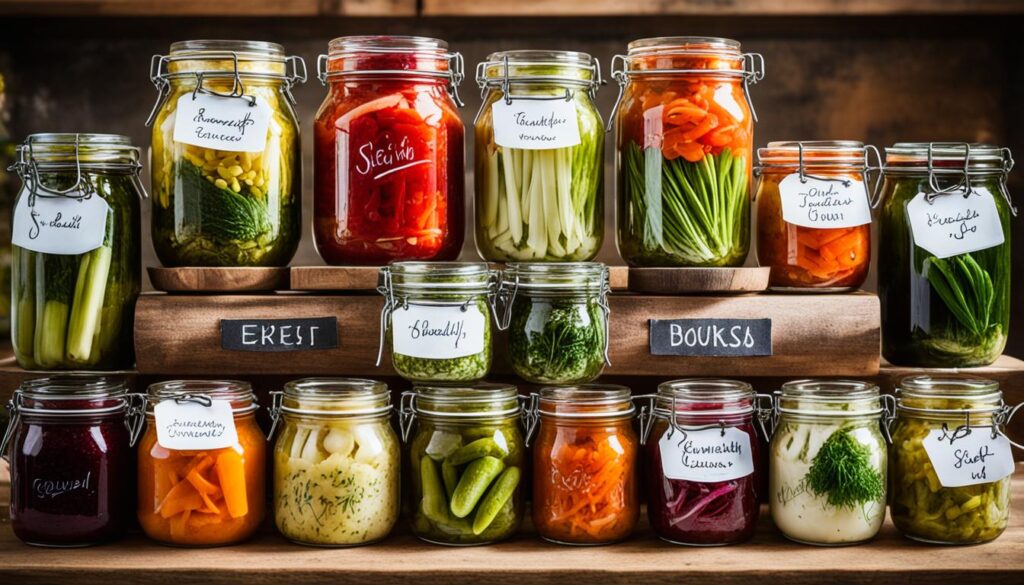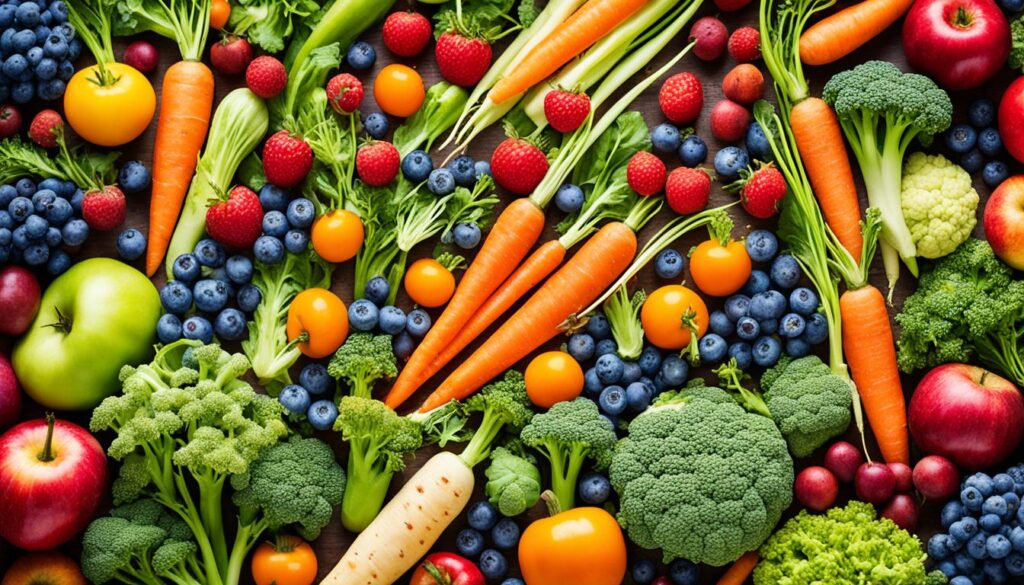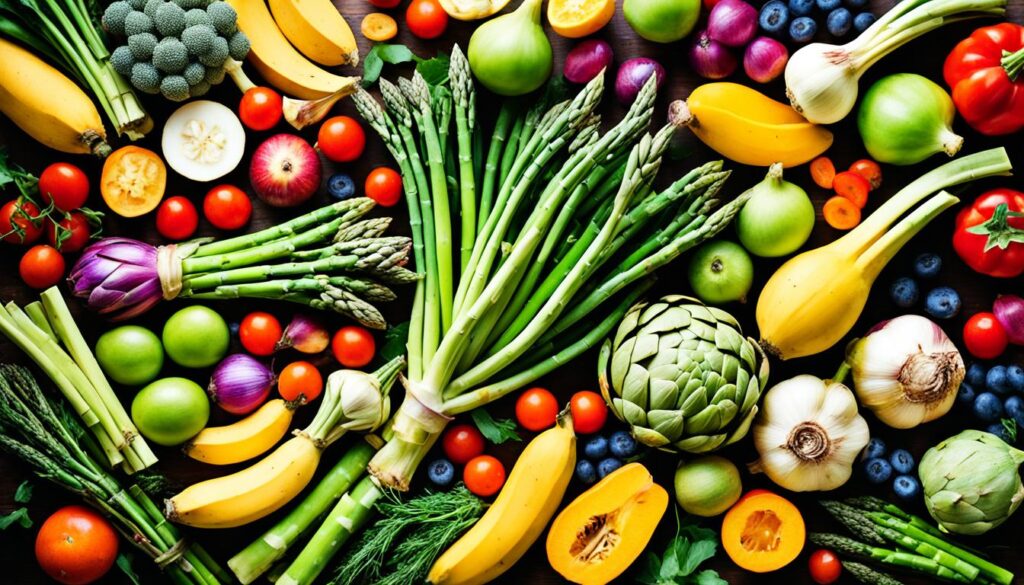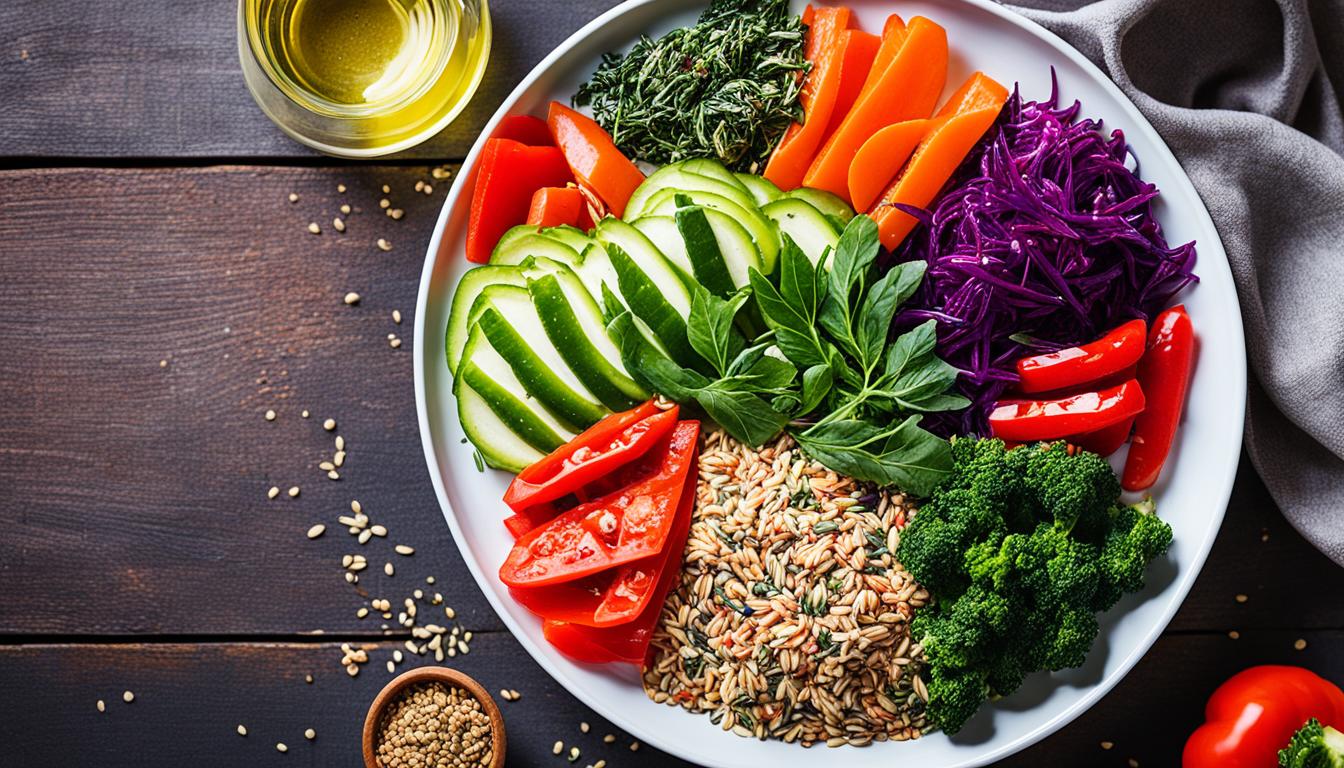Did you know that over 70% of your immune system is in your gut? This fact shows how important it is to keep your gut healthy. Eating the right foods can greatly improve your health. These foods help with digestion, mental health, and immunity.
It’s key to know which foods are good for your gut. This guide will show you how to make your gut happy. Foods like fermented ones and those high in fiber help keep your gut running smoothly. Adding these foods to your diet can make a big difference in your gut health.
READY TO BOOST YOUR WEIGHT LOSS JOURNEY? CLICK TO BROWSE AND PURCHASE RECOMMENDED ITEMS!
Key Takeaways
- Over 70% of your immune system resides in your gut.
- Gut health is vital for digestion, immunity, and mental well-being.
- Fermented, fiber-rich, and probiotic foods are essential for a balanced gut.
- Dietary choices can significantly impact gut health.
- Improving gut health with food can enhance overall well-being.
Introduction to Gut Health
Your gut is more than just a digestion machine; it’s key to your overall health. Eating the right foods can make a big difference in your life.
Why Gut Health Matters
Gut health is key for your body to work right. A healthy gut means better digestion, more nutrients, and a strong immune system. Eating gut-healthy foods boosts your digestion and supports your mental health. It also helps protect you from diseases.
The Role of Microbiome
Your gut microbiome is full of tiny organisms that are crucial for your health. They help break down food, make important nutrients, and fight off bad germs. What you eat can change the balance of your microbiome. Eating the best foods for gut health makes your microbiome stronger and more balanced.
Fermented Foods
Fermented foods are key to better gut health. They help with digestion and make it easier to absorb nutrients. The process of fermentation brings more good bacteria into your gut. This supports a healthy balance of gut bacteria.

Benefits of Fermented Foods
Eating fermented foods has many benefits for your gut:
- Improved Digestion: These foods are full of probiotics. They help with digestion and can ease IBS symptoms.
- Enhanced Nutrient Absorption: Fermentation makes vitamins and minerals easier for your body to use.
- Boosted Immunity: Eating these foods often can make your immune system stronger by keeping your gut bacteria balanced.
Examples of Fermented Foods
Here are some fermented foods you can add to your meals:
| Food | Description | Integration Tips |
|---|---|---|
| Yogurt | A classic probiotic-rich food made from fermented milk. | Enjoy it as a breakfast item or mix it into smoothies. |
| Kefir | A fermented milk drink that is packed with beneficial bacteria. | Drink it straight or add it to your cereal. |
| Sauerkraut | Fermented cabbage that is high in fiber and probiotics. | Top your sandwiches or salads with a serving of sauerkraut. |
| Kimchi | A spicy Korean fermented vegetable dish. | Use it as a side dish or mix it into rice and noodle bowls. |
High-Fiber Foods
High-fiber foods are key for a healthy gut. They help with digestion and keep bowel movements regular. Eating foods full of soluble and insoluble fiber is good for your health.
Importance of Fiber for Gut Health
Fiber is vital for a balanced digestive system. Soluble fiber absorbs water and turns into a gel-like substance. This slows down digestion. Insoluble fiber makes your stool bulkier, helping you avoid constipation. Both types of fiber help the good bacteria in your gut grow.
READY TO BOOST YOUR WEIGHT LOSS JOURNEY? CLICK TO BROWSE AND PURCHASE RECOMMENDED ITEMS!
Top Fiber-Rich Foods
Adding fiber-rich foods to your diet helps your gut health. Here are some great choices:
- Whole grains: Oats, quinoa, barley, and brown rice are full of fiber.
- Legumes: Beans, lentils, chickpeas, and peas have lots of fiber and protein.
- Fruits: Apples, berries, pears, and oranges are tasty and high in fiber.
- Vegetables: Broccoli, carrots, Brussels sprouts, and spinach are good for your gut.
- Nuts and seeds: Almonds, chia seeds, flaxseeds, and sunflower seeds give fiber and healthy fats.
Eating these foods often can make your digestive system healthier. Start adding more fiber slowly to avoid any issues. Remember to drink plenty of water to help with digestion.
Probiotic-Rich Foods
Eating foods high in probiotics is great for your gut health. These foods are full of “good bacteria” that keep your digestive system healthy. They help with digestion, ease IBS symptoms, and boost your immune system.
How Probiotics Support Gut Health
Probiotics add good bacteria to your intestines. They help break down food and absorb nutrients. They also keep away harmful bacteria, making your digestive system work better.
A balanced gut microbiome is good for your mental health too. It makes neurotransmitters like serotonin. So, eating foods with probiotics can improve your digestion and overall health.
Sources of Probiotics
Many foods are great sources of probiotics. Adding these foods to your diet can greatly improve your digestive health. Here are some top choices:
| Food | Description |
|---|---|
| Yogurt | A well-known source of probiotics; ensures a good intake of live bacteria cultures. |
| Kefir | A fermented milk drink similar to yogurt but with a more diverse bacterial profile. |
| Kimchi | A Korean dish made from fermented vegetables, offering a wealth of probiotics. |
| Sauerkraut | Fermented cabbage brimming with probiotics; beneficial for enhancing gut flora. |
| Miso | A traditional Japanese seasoning produced by fermenting soybeans; contains probiotics. |
| Tempeh | Made from fermented soybeans, this is a protein-rich, gut-friendly food. |

Bone Broth
If you want to boost your gut health, bone broth is a great choice. It’s not just nourishing but also packed with health benefits. These benefits include helping your gut health.
Nutritional Benefits of Bone Broth
Bone broth is full of important nutrients. It has a lot of minerals, collagen, and amino acids. These help support the gut lining and reduce inflammation. This keeps your gut microbiome balanced.
The nutrients in bone broth are great for your intestinal health. Adding it to your diet is a smart move.
Incorporating Bone Broth into Your Diet
Adding bone broth to your meals is easy and tasty. You can make it at home with bones from chicken, beef, or fish. Just simmer them with veggies and herbs for a delicious broth.
You can drink it on its own or use it as a base for soups and stews. Including bone broth in your diet gives you the gut health essentials you need. It makes your meals more nutritious and boosts your overall health.
READY TO BOOST YOUR WEIGHT LOSS JOURNEY? CLICK TO BROWSE AND PURCHASE RECOMMENDED ITEMS!
Leafy Green Vegetables
Adding leafy green vegetables to your meals is key to better gut health. Spinach, kale, and Swiss chard are full of fiber and essential nutrients for gut health. They have vitamins A, C, and K.

These greens are full of antioxidants that help keep your digestive system healthy. They have a lot of fiber, which helps you have regular bowel movements. This is important for getting rid of toxins in your body. Fiber also feeds the good bacteria in your gut.
Chlorophyll in leafy green vegetables helps clean your body. Eating these veggies often can make your gut microbiome balanced. This supports your digestion and immune system.
| Vegetable | Fiber Content | Vitamins |
|---|---|---|
| Spinach | 2.4g per cup | A, B9, C, K1 |
| Kale | 2.6g per cup | A, B6, C, K |
| Swiss Chard | 1.6g per cup | A, C, K |
It’s easy to add these leafy green vegetables to your meals. You can put them in salads, smoothies, or sauté them as a side. This way, you get to enjoy tasty food and boost your gut health with essential nutrients for gut health.
Prebiotic Foods
Learning about prebiotic foods can greatly improve your gut health. These foods feed the good bacteria in your gut, helping them grow and work well.
Difference Between Prebiotics and Probiotics
Many mix up prebiotics and probiotics. Probiotics are live good bacteria. Prebiotics are fibers that can’t be digested and feed these bacteria. They help good bacteria grow, keeping your gut diverse and strong.

Top Prebiotic Foods
Adding prebiotic foods to your meals can boost your gut health. Here are some top foods full of prebiotics:
- Asparagus: It’s full of fiber, which feeds gut bacteria.
- Bananas: They’re easy to grab and have lots of fiber that acts as prebiotics.
- Onions: Raw or cooked, onions are a great source of prebiotic fibers.
- Garlic: Garlic adds flavor and gives you important prebiotic fibers.
Adding these prebiotic foods often to your diet can improve your digestion and health. A mix of prebiotics and probiotics is best for a healthy gut.
READY TO BOOST YOUR WEIGHT LOSS JOURNEY? CLICK TO BROWSE AND PURCHASE RECOMMENDED ITEMS!
Incorporating Gut-Healthy Foods into Your Diet
Adding gut-healthy foods to your daily meals can boost your health. Whether you’re starting or adding to your diet, planning meals and smart shopping help a lot. These steps are crucial for better gut health.
Meal Ideas and Recipes
For gut health meal planning, mix in foods good for your gut. Here are some ideas to begin with:
- Breakfast: Overnight oats with chia seeds, and fresh berries. These are rich in fiber and prebiotics.
- Lunch: Quinoa bowl with mixed greens, roasted veggies, and kefir dressing. This combination provides a good balance of probiotics and fiber.
- Dinner: Grilled salmon with a side of steamed broccoli and a sweet potato. This meal supplies omega-3 fatty acids and soluble fiber.
- Snack: Greek yogurt with honey and a sprinkle of flaxseeds. This helps introduce beneficial bacteria to your gut.
Shopping Tips for Gut-Healthy Foods
When buying for gut health, focus on whole foods. Here are some tips:
- Read Labels: Look for labels that mention high fiber, whole grains, and live active cultures. Avoid products with added sugars and artificial ingredients.
- Go Organic: Organic produce often contains fewer harmful chemicals that can disrupt gut health.
- Focus on Variety: Aim to purchase a range of fruits, vegetables, and fermented foods. Diversity in your diet supports a healthy microbiome.
- Plan Ahead: Creating a shopping list based on your meal plans ensures you have all the gut-healthy ingredients needed for the week.
By following these tips and using these meal ideas, adding gut-healthy foods to your diet is easy. Remember, being consistent helps keep your gut microbiome healthy.
Top Foods for Optimal Gut Health Essentials
Let’s look at the best foods for keeping your gut healthy. Eating a variety of these foods can boost your gut health and help your microbiome. Here are the essentials:
- Fermented Foods: Foods like yogurt, kefir, sauerkraut, kimchi, and miso are full of probiotics. They help your gut by adding good bacteria.
- High-Fiber Foods: Eat veggies like broccoli, spinach, and carrots, and fruits like apples and bananas. They give you the fiber you need for a healthy gut.
- Probiotic-Rich Foods: Don’t forget about pickles and tempeh too. These foods are great for digestion because they have live cultures.
- Bone Broth: Bone broth is packed with collagen and amino acids. It helps keep your gut lining healthy.
- Leafy Green Vegetables: Spinach, kale, and arugula are great for your gut. They’re full of fiber, vitamins, and minerals.
- Prebiotic Foods: Foods like garlic, onions, asparagus, and whole grains feed the good bacteria in your gut. This helps them grow and work better.
| Food Type | Examples | Health Benefits |
|---|---|---|
| Fermented Foods | Yogurt, Kefir, Kimchi | Introduces beneficial bacteria |
| High-Fiber Foods | Broccoli, Apples, Bananas | Maintains a healthy digestive tract |
| Probiotic-Rich Foods | Pickles, Tempeh | Improves digestion |
| Bone Broth | Homemade, Store-Bought* (without additives) | Supports gut lining |
| Leafy Green Vegetables | Spinach, Kale, Arugula | Enhances overall gut health |
| Prebiotic Foods | Garlic, Onions, Asparagus | Feeds beneficial bacteria |
Adding these foods to your meals can really help your gut health. A balanced diet supports a healthy gut microbiome, which is important for your overall health.
READY TO BOOST YOUR WEIGHT LOSS JOURNEY? CLICK TO BROWSE AND PURCHASE RECOMMENDED ITEMS!
Foods to Avoid for Gut Health
Keeping your gut healthy means eating foods that help it and avoiding those that don’t. We’ll talk about foods that can upset your stomach and suggest better options for your gut.
Common Gut Irritants
It’s key to know which foods can make your gut unhappy. Here’s a list of foods to avoid:
- Processed foods
- High-sugar items
- Certain artificial additives
- Artificial sweeteners
- Fried and fatty foods
Alternatives to Unhealthy Foods
Instead of eating foods that hurt your gut, choose ones that help it. Here are some tips to avoid bad foods and pick better ones:
| Gut Irritant | Healthy Alternative |
|---|---|
| Processed snacks | Fresh fruits and vegetables |
| Sugary drinks | Herbal teas and water |
| Artificial additives | Natural herbs and spices |
| Artificial sweeteners | Honey or maple syrup |
| Fried foods | Grilled or baked alternatives |
Conclusion
Adding foods great for gut health to your daily meals can greatly improve your well-being. Eating fermented foods, high-fiber foods, and nutrient-rich items like bone broth and leafy greens helps a lot. These foods make sure your digestive system works well, making you feel better in body and mind.
We talked about how important it is to make smart food choices for gut health. This guide has highlighted the importance of these choices. It encourages you to slowly add more gut-friendly foods to your diet. Even small changes can make a big difference in your health.
Improving your gut health is about being consistent and making better food choices over time. Taking care of your microbiome leads to many positive changes. This guide will help you, whether you’re planning meals or shopping for groceries, to keep your gut healthy.
READY TO BOOST YOUR WEIGHT LOSS JOURNEY? CLICK TO BROWSE AND PURCHASE RECOMMENDED ITEMS!

